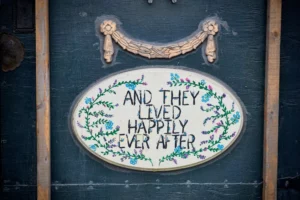I couldn’t believe it.
The “it” in question in this case was a revelation that emerged at the end of my second date with the woman I’d eventually ask to marry me. A conversation about our favorite movies meandered into the subject of music, and I was shocked — and delighted — to learn that Jennifer had a guilty-pleasure fondness for any number of ‘80s hair metal bands. As did I.
Now, as far as my “list” was concerned, this certainly wasn’t the highest priority in terms of what I was searching for in a mate. But it was on my more comprehensive “you complete me” addendum, a fairly long litany of things that, while they didn’t really matter, would sure be nice to have in a spouse. I mean, I could marry someone who couldn’t stand Bon Jovi, but why would I want to do that?
We did get married. And while I don’t know that I ever subscribed wholeheartedly to the whole soul mate philosophy, I definitely felt I’d found someone with whom I shared so many similarities, from the profound (our faith, our sense of mission and purpose) to the superficially silly (see story above).
Speaking of superficial, after we got married it became apparent that my new bride’s interest in that music was significantly less than my own. Turns out she was actually a much bigger Keith Urban fan than I realized.
That may seem like a ridiculous story. But it’s indicative, I think, of the lofty expectations (even in areas of no real consequence) that we carry into our quest for “the one.” Not only are we looking for core commonalities — faith, friendship, shared values — but we’re often seeking a sense of complete existential fulfillment from marriage that is relatively new, historically speaking.
In his book The Meaning of Marriage, Presbyterian pastor Tim Keller spends the first chapter unpacking how we got to this place culturally and why the quest for such a soul mate is ultimately doomed to disappoint. Keller bluntly insists that “no two people are compatible,” and he quotes Duke University ethics professor (and Christian) Stanley Hauerwas, who writes,
Destructive to marriage is the self-fulfillment ethic that assumes marriage and family are primarily institutions of personal fulfillment, necessary for us to become ‘whole’ and happy. The assumption is that there is someone just right for us to marry and that if we look closely enough we will find the right person. This moral assumption overlooks a crucial aspect to marriage. It fails to appreciate the fact that we always marry the wrong person.
Keller comments, “Hauerwas shows that the quest for a perfectly compatible soul mate is an impossibility. Marriage brings you into more intense proximity to another human being than any other relationship can. Therefore, the moment you marry someone, you and your spouse begin to change in profound ways, and you can’t know ahead of time what those changes will be.”
In addition to that reality, Keller identifies several significant theological reasons why one person can never shoulder the burden of being a soul mate. “Any two people who enter into marriage are spiritually broken by sin, which among other things means to be self-centered. … As author Denis de Rougemont said, ‘Why should neurotic, selfish, immature people suddenly become angels when they fall in love … ?” He then adds:
Modern people make the painfulness of marriage even greater than it has to be because they crush it under the weight of their almost cosmically impossible expectations. Pulitzer Prize-winning author Ernest Becker believed that modern culture had produced a desire for what he called ‘apocalyptic romance.’ At one time we expected marriage and family to provide love, support, and security. But for meaning in life, hope for the future, moral compass, and self-identity we looked to God and to the afterlife. Today, however, our culture has taught us to believe that no one can be sure of those things, not even whether they exist. Therefore, Becker argued, something has to fill the gap, and often that something is romantic love. We look to sex and romance to give us what we used to get from faith in God. … [We embrace] the illusion that if we find our one true soul mate, everything wrong with us will be healed; but that makes the lover into God, and no human being can ever live up to that.
“Cosmically impossible expectations.” I think that’s a good shorthand summary for the way our culture’s emphasis on finding a soul mate can go idolatrously awry. God, in contrast, invites us to step across the threshold of marriage not with our own fulfillment in mind, but with the vision of sacrificially loving and serving another person ‘til death do us part.
Eight years into that journey, I’m still learning about how deeply self-centered I am, and how the greatest fulfillment in marriage has more to do with laying my life down for my wife (and children) than trying to make sure all of my own needs get met on my terms. It’s been an amazing, and at times hard, journey thus far.
And along the way, I’ve even become a Keith Urban fan.










